Back Home
Jens Keller looked out at the packed stands of the Alte Försterei for the first time, they were in fine voice this evening. He had expected it to be loud, and he’d managed in the Champions League after all, but this was really something. The Dynamo Dresden fans in yellow and black buzzed malevolently to his right, a thousand and some ugly Saxon hornets. The Unioner were in red and white and black everywhere else, the old fashioned terraces of the Alte Försterei were filled to bursting with fans stood cheek by jowl, from the tops of the stands where people used to only have to turn around 180 degrees to piss off the back down the steep dirt slope, to the very edge of the pitch, separated from it only by a brutal red steel fence undermining everything the German football authorities say about treating fans like people.
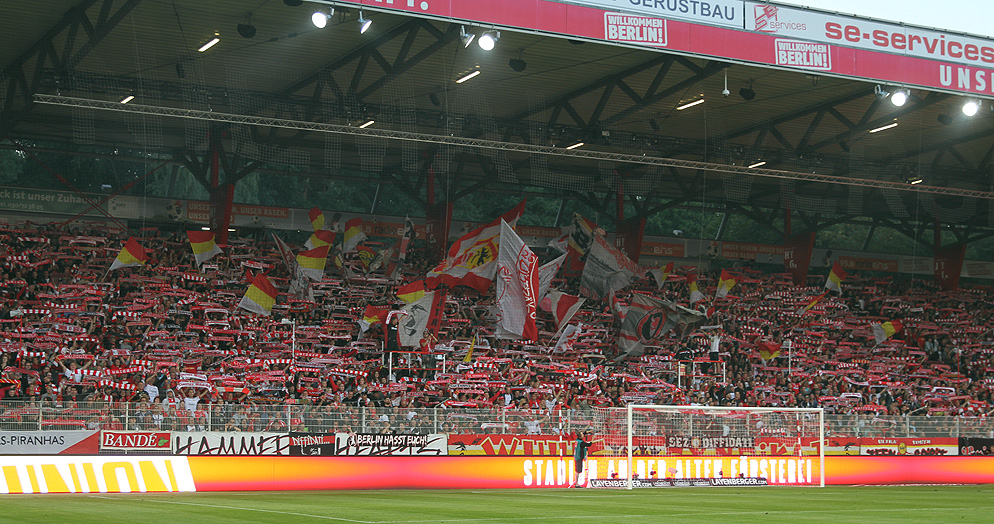
Beered up, loved up, they roared as one. They were largely pretty ugly too. The drums thundered and the ticker tape made out of the city’s mountain of spare beer doilys flitted like drunken butterflies over the peoples heads and the golden embers of the late evening sun shone down on it all, illuminating this riotous carnival, this strange ritual, this meeting of contradictory visions of what was once called the DDR. The giants of the Venice of the North and the arrivistes, the capital city club who had gone up and down between the divisions so many times that their current flush of on the pitch success, sound management and genuine fan engagement off it feels like an aberration.
Eisern, they roared.
Keller wore his black polo shirt and blue jeans, the day-glo laces on his spotless trainers fit to the kaleidoscopic surroundings nicely. He looked out at the packed stands of the Alte Försterei, stepped forwards towards the edge of his technical area and took a breath. He’d been thinking about a friend of his. She’d have enjoyed this too, but almost everyone else was there who should have been. Henrik, his confidante, his right hand man, was there and Böni, his link to the past and his trainee, too. They had helped him prepare his side as best they could, and they had told the players enough that with a bit of luck, a lot of skill, a touch of patience and a shit load of hard work they could really make something of this season. Further to the left of them still, sat on the bench, looking at his fingernails, trying not to think too much about the fact that he wasn’t starting, was Michael Parensen.
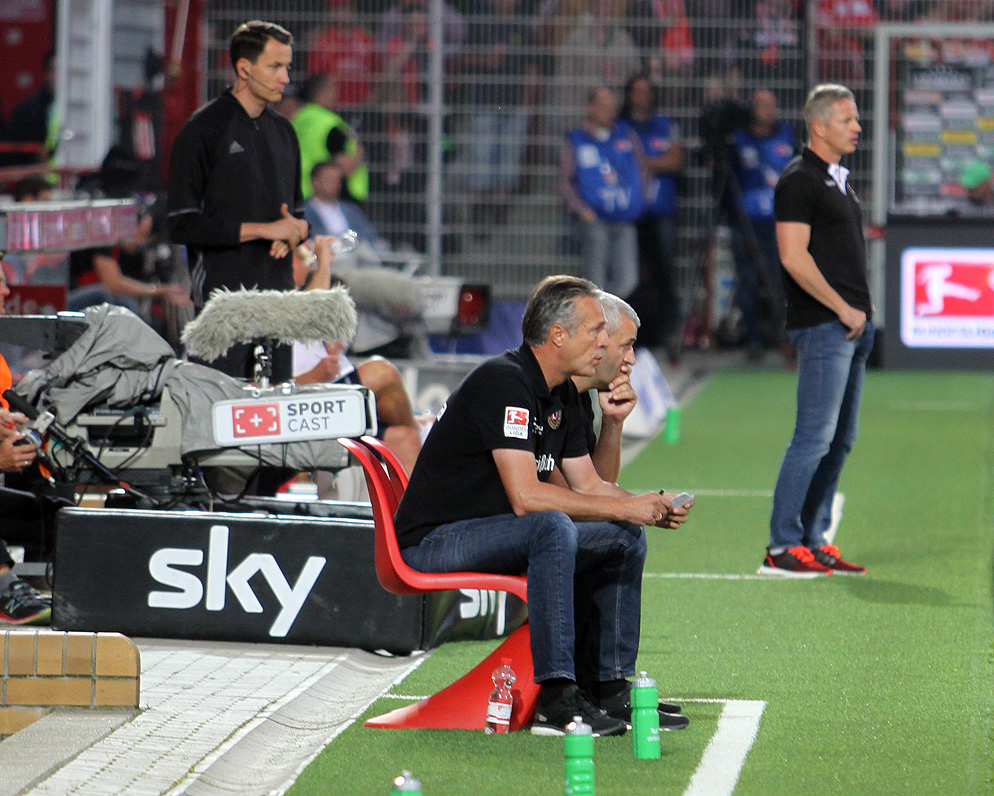
He had, of course, seen this all before, he’d been here longer than any other player having been brought in by the man down the touchline a bit to Keller’s right where Uwe Neuhaus looked years younger. The sparkle in his eyes that had all but disappeared towards the end of his tenure in Berlin had returned. He was tanned and enjoying himself at Dynamo. They’d just won the third division, just as he had done with Union, with Parensen. He’d already seen some old faces around the place. They were friendlier than they were when he was last here, when he left. Steven Skrzybski had singled him out straight away. In his polite, mild-mannered way he had wanted to say thank you.
Yes, they made a hell of a spectacle and a mighty fine racket in the Alte Försterei on that Monday night, the first home game of the season, and almost everyone who was supposed to be there was there. Almost. But not everyone.
Southern Man
Michael Parensen knows that there are more important things in life than football, but he also knows that once you cross that white line, there is nothing else that matters. In the middle of a game once he turned and let Neuhaus have it with both barrels, shouting, you do your fucking job and I’ll do mine. He says he’d never do the same to Keller, but if the situation called for it he almost certainly would. Neuhaus would rarely concede that anyone else was right ever again, but he took it from Micha Parensen for Micha Parensen is not only a gentleman – on entering the press room recently he refused all handshakes until he’d shaken that of the woman journalist who was actually closest but was largely ignored by the two men in the room – he is also an intelligent man, a man who knows. He implicitly understands that in football at the highest levels it is the tiniest of details that end up counting towards the most seismic of things, and he is always worth listening to.
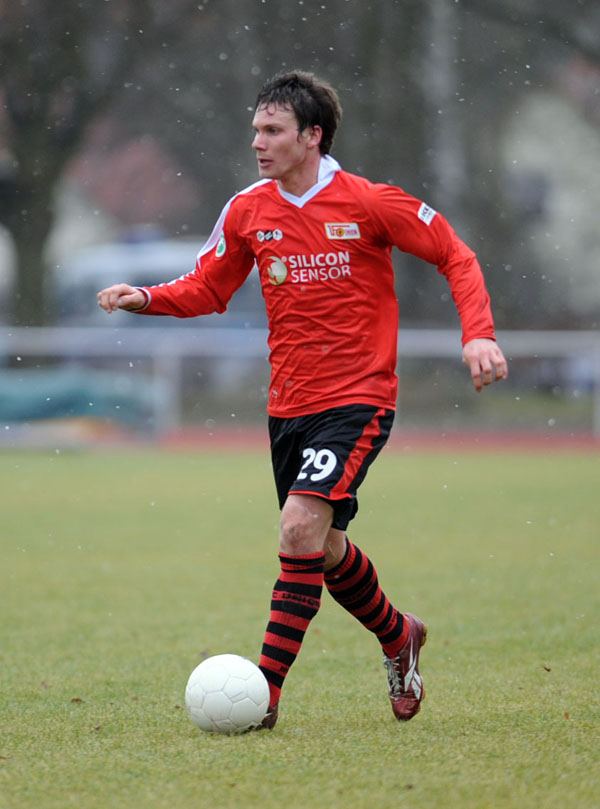
No-one expected Parensen to stick around for much of a time when he arrived. He was just a left back who could help Union over the line in the third division in the occasional absence of Patrick Kohlmann. He’d be off soon enough, the fans all thought. He was a small town boy who studied bookkeeping in his summers, who found Berlin to be loud and frenetic and who seemed to all and sundry like the kind of person who would be appalled by the very idea of a battle cry. He is the sort of man who doesn’t care that the rest of his training kit is being undermined by the inescapable presence of unbranded Primark plain black socks under his expensive red and black flecked Nikes.
But there were tears in grown men’s eyes when his knee went so horrifically against Hertha, as he writhed on the stretcher, his fists clenched, his, jaw locked, his teeth, wonderfully normal, slightly imperfect in a world of flashing white enamel, gnashing in agony. As a player and as a man, it had become apparent pretty quickly that Parensen was one of them.
He watched most of this season from the bench or, worse still, the stands. He’s a pro, he knows how these things work and he was determined not to let anyone down when they called on his talents, but still… “I don’t know if I can then watch the games like a fan. It’s been a long time, I don’t really know how a fan feels. I can’t compare, but maybe I’m going through something similar.”
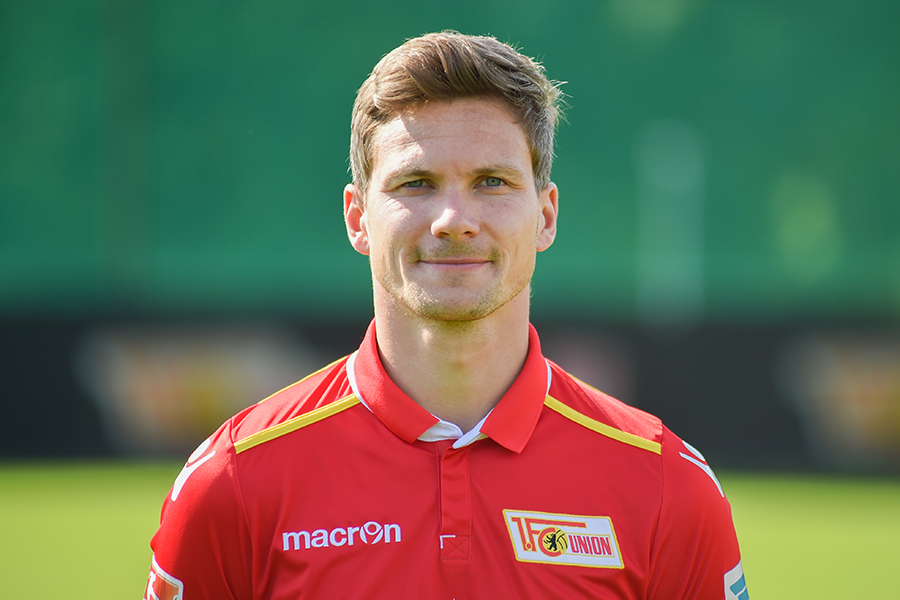
He is greying at the temples now. And the veins on the back of his right lower leg bulge out slightly in places like those of an old lady that’s spent too many years humping shopping bags up and down the stairs to her fifth floor flat. But his voice is louder than it was only a couple of years ago, more commanding. He is louder in interviews now, too, and he bellows across the pitch, but then he always did that. He has become a Berliner. He speaks his mind and the softened vowels he used to have have hardened. “There was a development, sure. When you come to Berlin, it’s a big city… it’s difficult. I’m much more relaxed here, there’s things here that I can deal with better now.”
Underdog
Though they may be often drunken and largely unintelligible to outsiders, if those wonderful tropes of country music and the stories of 1.FC Union Berlin have taught us anything, then that is that life doesn’t always end up the way it does in our dreams.
But to suggest that it is a glass half empty sort of football club, though, would be to miss the point. “We are not pessimists, that pissed me off when Keller said that,” says Mario Jänicke, a man who as a fan and now a representative of Union, knows the club inside and out and who has followed them up and down for the best part of two generations. Mario never gave up on Union when things were at their worst as many did, he is a proud Eiserne biker, a collective remarkable for their openness in a scene not famous for it, for their devotion to their football club and to the open road, even though he can’t ride at the moment. He has a handsome big nose, good friends, he limps on his left hand side and he understands the love generated at this club more than anyone else. He is a remarkable man. They may not be inherently pessimistic, no, but they do have a way of revelling in the vicissitudes of a lifetime’s lack of success.
There’s a beautiful short story by Torsten Schulz, published in the book Zonenfußball, that takes place as the author schemes to, and then successfully wins the heart of a woman during a run-of-the-mill and entirely predictable 4-0 Union loss at home to Eintracht Frankfurt, that ends with the lines:
Some time, about five or six years later as we were in the throes of breaking up I thought to myself: that I had been overjoyed about my team losing was actually an absolute betrayal. And love cannot ever be built on betrayal.
He’s right, love cannot be built on betrayal. Instead it is often forged through the toughest of times. Mario knows how ridiculous it sounds when he says that his favourite Union game of all time was the loss in the play-off to reach the 2.Liga after a 19 goal penalty shootout away at Osnabrück just after the turn of the millennium, but on that night he found out once again how this club was different, how what mattered was not the winning but the community, the family, the sense of belonging and all its attendant drinking and singing and hugging and kissing and crying. Just like country music.
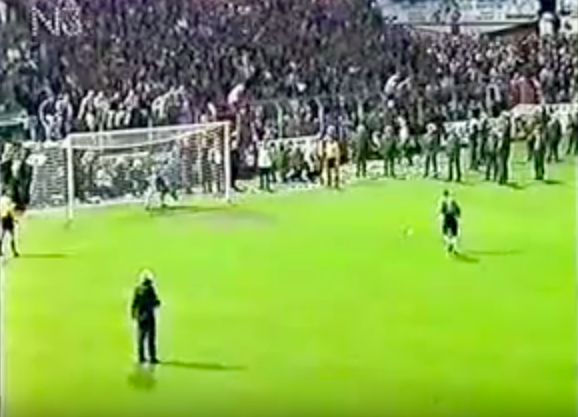
So when people outside the club talked of promotion to the Bundesliga they still mostly meant it in the same way that kids mean it when they say they are going to be astronauts or alcoholics do when they say that they will stop drinking. Not in 2017. At some far off point in the future. It was still somewhat vague.
Because they aren’t used to sustained success out here in Köpenick. For example, 21 years ago, on April 27th, 1996, Union were beating BFC Dynamo 4-0 in front of only 1,500 people at the Alte Försterei. It is a pitiful number unimaginable only a decade before, in the days when the derby would fill the Stadion der Weltjugend. This is how bad things were getting, how low Union were slumping, they were lurching from crisis to crisis, sometimes self-inflicted, often not. Mario kept coming to games but thousands stopped altogether.
Coincidentally, on the same day, Jens Keller levelled the scores for Wolfsburg in Mainz at 1-1 (it is a quirk of history that the opener had been tucked away by a Jürgen Klopp who is on record as never wanting to manage Union, and who wouldn’t be welcome if he did). Keller was aware of Union, he came here as a player a couple of years later as he helped lead Eintracht Frankfurt to promotion, but, well, they were small fry. As he celebrated his goal that night in Mainz he had no idea that a derby had even taken place in Berlin. Nobody cared any more and he was thinking about the Bundesliga anyway. “I had never really looked at them as a club at all,” is all he says, years later. “I never had any dealings with them until they showed the interest in signing me.”
The new world of German football was just as unforgiving and unkind to Union as the old one had been. Though they were hardly alone in all of this. In the return fixture between Union and Dresden in January Dixie Dörner and Klaus Sammer looked on like ghosts, apparitions of a time when theirs was the most powerful of conquering football kingdoms. They were one-club greats in a one club city. But the promises that had been made for the aftermath of socialism were scantly kept. The grave of Mäcki Lauck, the best player on the pitch when the DDR beat the BRD in Hamburg, lies largely unattended. The contract on it runs out this year. The footballers and the football clubs of the DDR were as treasured as their institutions. They were either torn down or allowed to crumble.
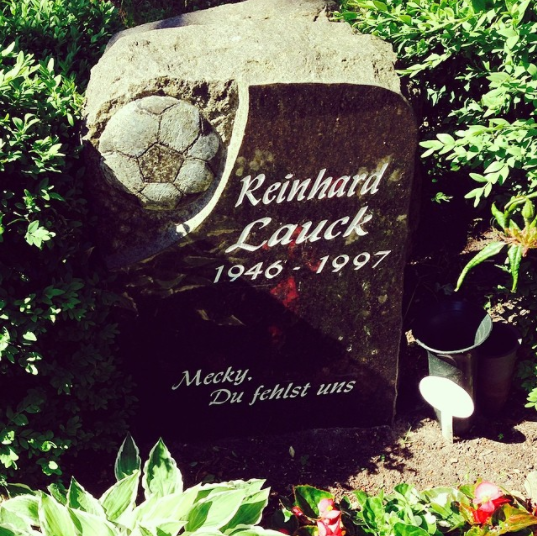
To survive, let alone flourish, Union had to use the lessons learned, ironically, in the DDR, the country ruled by a regime that they define themselves as having been in opposition to. Lessons about making do, about using what resources they did have. If they were to survive then they would have to hold together, they would have to do it alone. Like a family.
Or, in the words of Henrik Pedersen, “We have a fantastic club with a fantastic philosophy. But it doesn’t help if we are afraid to also be ourselves.”Another football was, indeed, possible. In the case of Union it would be up to the few, fans like Mario, who still cared, to rebuild Union.
No, they are not pessimists, but it is in this context, the context of how low Union had fallen, that one must look at how far they have really come.
The man comes around
“It’s one of my strengths, I’m always relaxed. If you’re not, you can’t perform.” Jens Keller leans back into the palatial style padding of the modern dugout. There’s no wooden benches in the 2.Liga, not even at a club of the workers. And indeed he does look relaxed even though he has just spent the last twenty minutes performing his weekly ritual with the press, a dance which he’d really rather not have to do and which often frustrates the hell out of him. “I didn’t do it for a long time… then I got myself across perfectly well.” He laughs and smiles the smile of one who can see the pitch in front of him at last.
He can smell the grass, he can see the lines painted out, his technical area, a small white rectangle that struggles to hold him during even the easiest of games is within grasping distance. Jens Keller remains a footballer at heart, and not just a footballer. Like Neuhaus before him, he was a central defender, he bled and sweated, he worked. He would stick up for his smaller, slighter teammates. So he’d make a terrible diplomat. His life would be a lot easier if he could just plaster on a fake smile every once in a while, but like most central defenders he’s a bad liar. His face gives too much away.
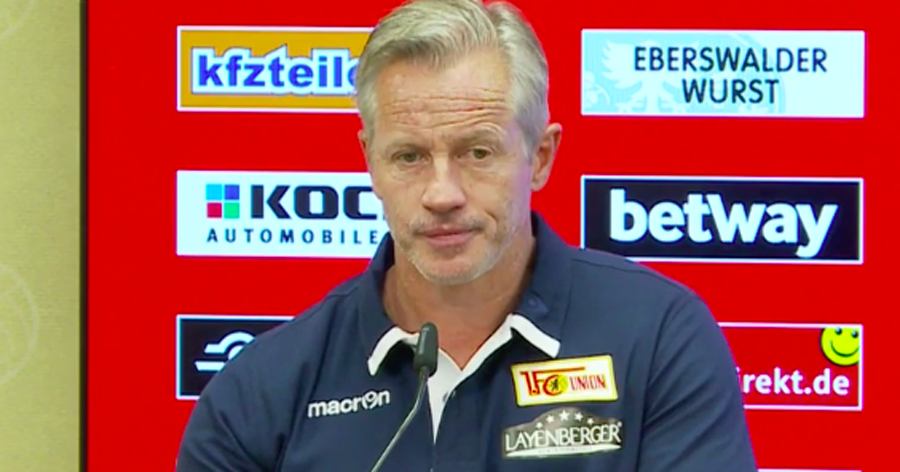
He’ll roll his eyes, he’ll rest his head against the microphone in front of him as if to say “Please, Jesus no, not this again”, his eyebrows raise and contract and twitch in collaboration with the lines on his forehead. They swoop around like the storms raging around the giant red spot on Jupiter. His lips pout, he looks at the floor, exasperated, he checks his fingernails, he gazes over the heads of the journalists.
There was one time, in the press conference before the Aue game, where some poor guy tried a new approach, he flowered up his question, he moved slowly around the crux of his point the way Zizou would move deftly around the ball: without touching it unnecessarily, just letting it roll where it wanted to go. But Zizou was a genius and he would suddenly instigate an action, this journalist didn’t. He ambled before ending somewhere with a question mark at the end. Keller looked up from his miserable reverie. He’d been staring at his stirring of his coffee for ages now. He smiled playfully and then scowled.
“No,” was all he said.
At least it’s better here. At Schalke there was national interest, not just local. Once Keller’s son got into a fight at school and it was reported in the papers. It was a shitty situation. At least in Berlin he can have his fun with the journalists. He can play his games.
He’ll appear at once, suddenly, like a well dressed ghost with a side parting so impeccable you could use it to put up shelves with. “Mahlzeit” he’ll say perfunctorily, and then, before you know it, he’ll be gone. Poof, just like that, as Tommy Cooper used to say.
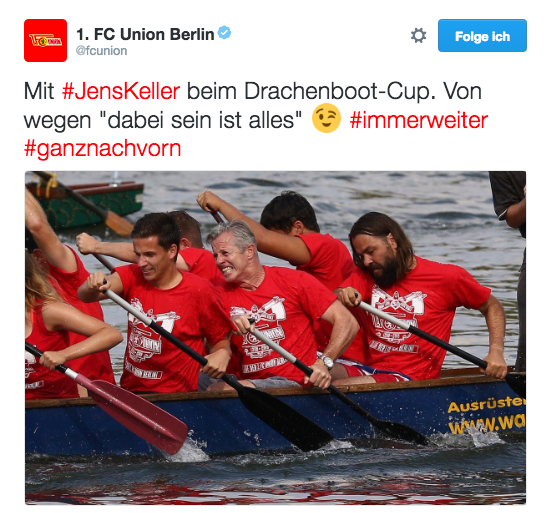
Jens Keller should probably be managing a much bigger club than Union Berlin. He had always claimed that the level his employers played at was never important, but nobody ever really believed him when he said it. Typically, though, he stuck to his word. “Leading a team is the same everywhere. It’s the same here as it is in the Champions League. The quality is definitely different, but otherwise it’s the same. Nothing changes.” Players are just humans. This is important.
Keller’s dad was an engineer at Mercedes in Stuttgart (as, presumably, were everyone else’s dads in Stuttgart in the 1970’s), but he’s quick to disavow the notion that his job is in any way similar, and that his use of systems, careful delegation, and the bringing together of tightly controlled parts into a cohesive whole is nothing of the sort, really. His job is about people and about emotions, he says. Footballers aren’t automatons, Union is certainly not Mercedes, and there is little space for over reliance on long term planning when things change every day depending on the scores, on the table, on the emotions blazing around inside a tightly cramped changing room. He has to be reactive, he says, and he is allowed to be a romantic, too. You don’t get that at Mercedes.
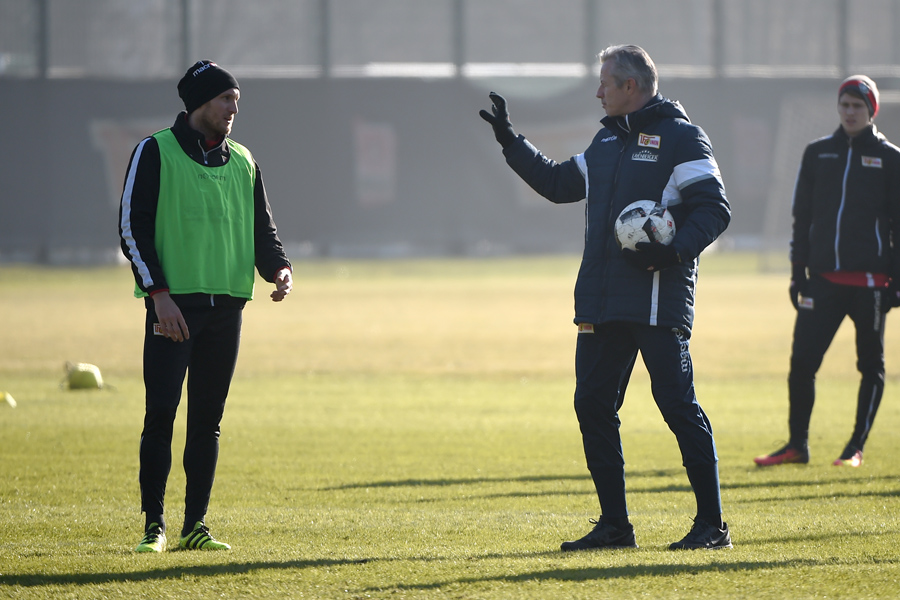
He is hugely proud of the steps his players have made this year. Of Leistner and Trimmel and Skrzybski, of the youngsters, Kristian Pedersen, Simon Hedlund and Philipp Hosiner. “What gives me most joy of all is to be on the training pitch.” It shows. He smiles during sessions, despite the rain, despite the fact that he can only join in the occasional games near the end, when they’re relaxing, winding down. He passes the journalists and emits his single “Mahlzeit”, but turns back to Stefan Fürstner, wandering back off to get dry and changed. Keller slaps him on the back, says something into his ear and emits a belly laugh. The captain carries on, smiling now. Despite the rain. Keller kicks a ball whenever it is near with glorious ease.
He was never a player of the absolute highest calibre. He was never a Champions League level player, but he was still very good and there are coaches such as Willi Reimann who would still pick him today if they had the choice. Reimann took him to Eintracht Frankfurt when his career should’ve been winding down but he needed a leader on the pitch and a defender who knew what he was doing. Reimann and Keller lead them straight back up.
It is here, not in the press conferences or the conference rooms, that he is supposed to be, and he knows that he always was, ever since he used to follow his big brother around the parks and the pitches of the fringes of Stuttgart, chasing the wildest of shots, fishing balls out of trees and bushes and from over fences.
He claims he isn’t really interested in the past, but flinches when asked about that goal he scored in Mainz in 1996. “It was my only one of the season? You sure about that, I thought I got a couple more?”
He didn’t.
“Ach, Ja. I’d only been there six months anyway.” The ego is essential to anyone to have made it this far in professional sport, and his is still nicely intact. He will tell you that he managed in the Champions League as often as he can. He told his players in the days before the Heidenheim game when all seemed already lost that his Eintracht team had gone up when they needed to score three goals in the last five minute of the last game of the season, mostly to tell them that anything was possible, but also to remind them that he had done this before and succeeded and that they could trust in him.
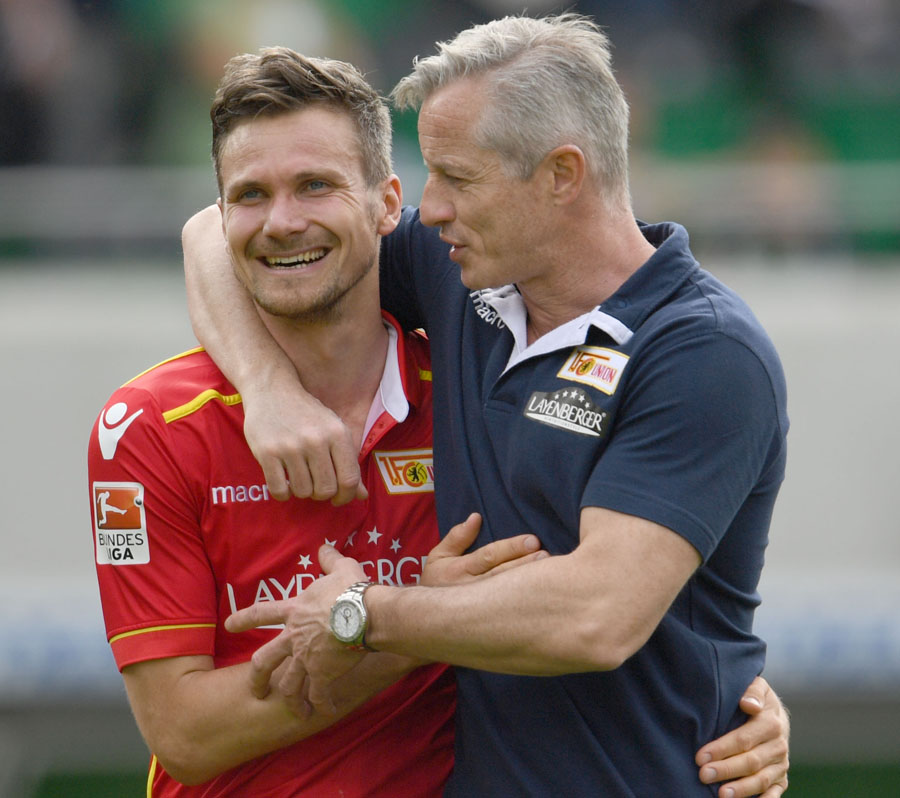
Parensen says that the similarities to Neuhaus don’t end with the size of their watches. They find a mix between being the alpha male and being relaxed. “Self confident? Yeah, of course. Because of what they have already achieved and the way that they bring their idea of how football should be played across.” It is probably a defender thing but he is too long in the tooth to fall into that trap. “I don’t know what they were like as players” is all he says. It’s a shame, because Micha has been both, a midfielder and a defender and is perfectly placed to say what makes them tick. It’s unlikely Keller would ever give that much away, anyway.
Pale Blue Eyes
Henrik Pedersen apologises for being late, before, unprompted, he begins a story of ups and downs that somehow, in its very incongruousness to this corner of the world, fit perfectly to where Union found themselves those feverish few weeks when anything seemed possible in the Spring of 2017. His is a tale that begins with a football obsessed young man in Denmark who had his dreams shattered along with his Achilles tendon and his left knee, before wending its way to Köpenick via the hated Red Bull.
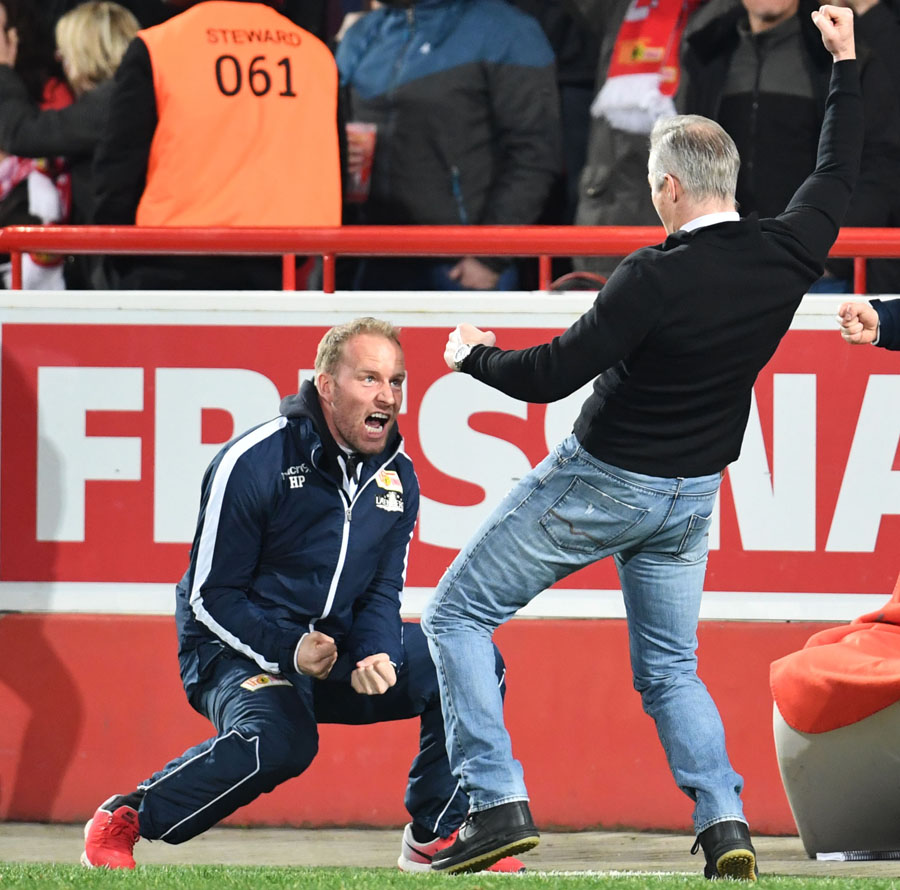
He understands the anger directed at the nouveau riche winged upstarts, but he won’t apologise for having spent the last eight years working at increasingly more integral levels for them, refining his skills, honing the techniques that make him one of the most modern of football coaches. “Every day I learn more and more and now, of course, I have a big heart for Union. At first when I came here I was Henrik from RB, but now I am just Henrik. And like all other relationships, you need to grow together and to find each other on a higher level. It’s come. I feel good here.”
Henrik lived to be a footballer, it was the sum totality of his existence before, bang, that was it. He had to take a new path. “It was my identity, and then it was gone, but as with all things in life, it makes sense now. Instead of wanting to be a top player I decided to become a top coach.” He invokes Danish football royalty within moments when he says how he could never take the same path to management as Michael Laudrup, for instance, and his story flits breezily through the offices of the likes of a Claudio Ranieri who was wonderful and warm and open hearted to him, and to whom he says he owes the world. He kicked open doors that should never have opened to him in the first place. He spent years off his own back watching Barca and Chelsea and Liverpool train. He studied the game as he studied the people who play it as he studied himself.
“When I was 28 I had a depression and it was here that I started to build my own life, on my own terms. And I started to find out who I was. I am Henrik, and I am a football coach. It’s a feeling, something you cannot read in a book, you need the experience, your own knowledge in your unconscious.”
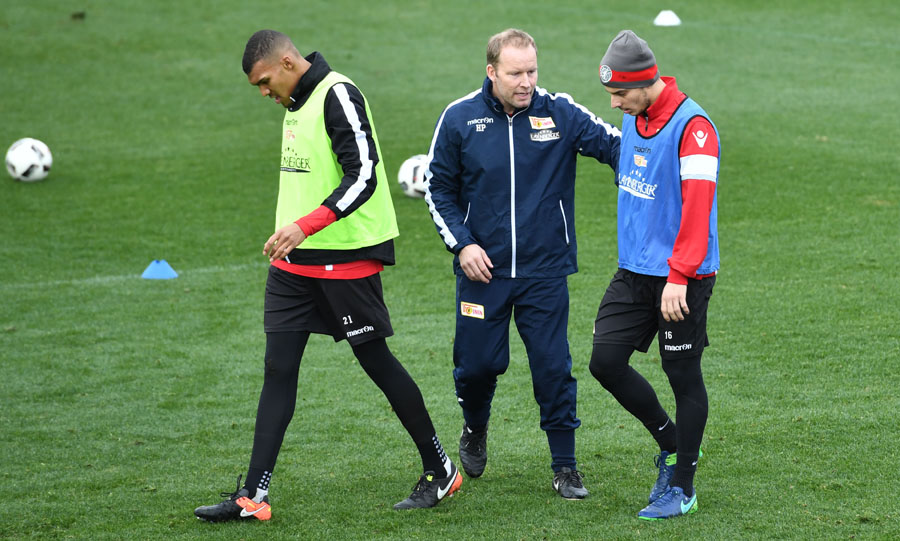
It was after this that Pedersen realised the absolute importance of the present, when he recognised the fact that what holds us back is only ourselves and our reliance on living in either the past or in the future; that we all fight a battle between “the head and the heart.” He speaks like a Californian self-help guru. He’d make a great cult leader. There are flashes of it in the way that he draws you deeper and deeper into his softly spoken universe where anything is possible if you believe in yourself and you live in the now. “Do you have angst, are you afraid of the future? If we are in the head we are always thinking about the past or the future. Or are we in the moment? Then we are here, as we are now. We are in the moment.”
It is bewildering, and written down it makes almost no sense. But when you hear it at the time he lets you know he is with you, holding your hand throughout this journey. He smiles beatifically, pale Nordic blue eyes locking onto yours, and he peppers the monologue with questions, confirming that, yes, you do really know what he means. He works closely with his players, he gets them into a room one on one, he tells them what he knows they can achieve. “A lot of coaches just work on their playing philosophy, but they forget the human. But you are working with people. And then they don’t understand when it doesn’t function.” He sits back, letting it all soak in for a second before making sure it has. “It makes sense?”
It is hard to say whether it does or not sometimes. But you like him, it works.
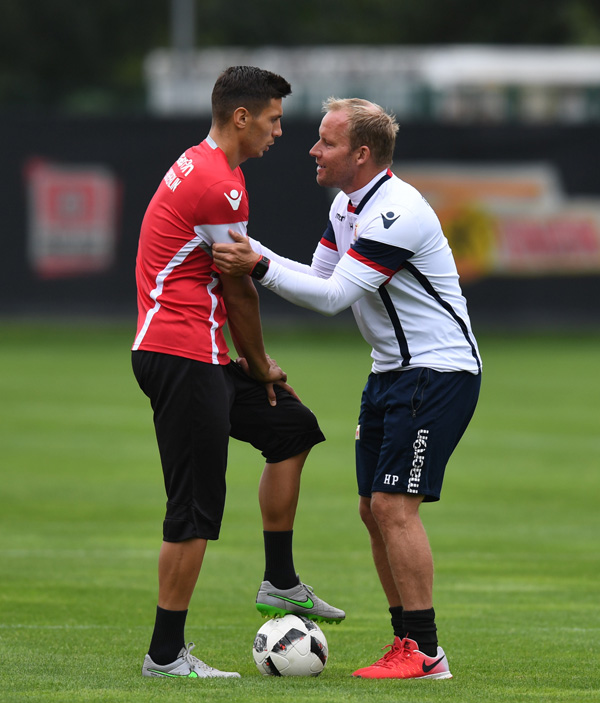
He puts out cones on the training pitch in the shitting rain at 10am on a Thursday morning with the same tightly focussed intensity. His eyes trained at a spot about a metre in front of his toes, he drops them in exactly the right place. Exactly. He raises his voice when necessary, he’s not some cerebral professor, the hair dryer still works, he says, but its not as effective as it used to be when dealing with modern footballers. You need to remember they are human beings with human failings. He will lead large parts of training. He is a constant noise on the bench, too, his celebrations as he bounces up and down on the touchline, high fiving his players, reaffirming their belief in themselves and in the present, are a joy to watch. He is the first one in and the last one out of the changing rooms, he leads players in one on one sessions, locking their eyes into contact with his, telling them about their head and their heart and teaching them to establish which one is in control at what point, and why it should probably be the other way around.
It’s just about being brave. “This is a worldwide problem. We are afraid not to be good enough.”
Reach out (I’ll be there)
It was March, the sun had been barely seen in the long months months since the beginning of the season, and Union, in an unprecedented 3rd place in the league were leading 1-0 against a Wurzburger Kickers side a man up after Roberto Puncec’s sending off for two elbows in the space of five minutes that looked unjust at the time, but that with hindsight just looked a bit stupid. He’d allowed himself to be wound up, he’d fallen into the simplest of traps, and now Union were coming under increasing pressure. Valdet Rama and David Pisot were hugging the right flank, being as much of a pain in the arse as possible, combining to tear a hole in Union’s left hand side.
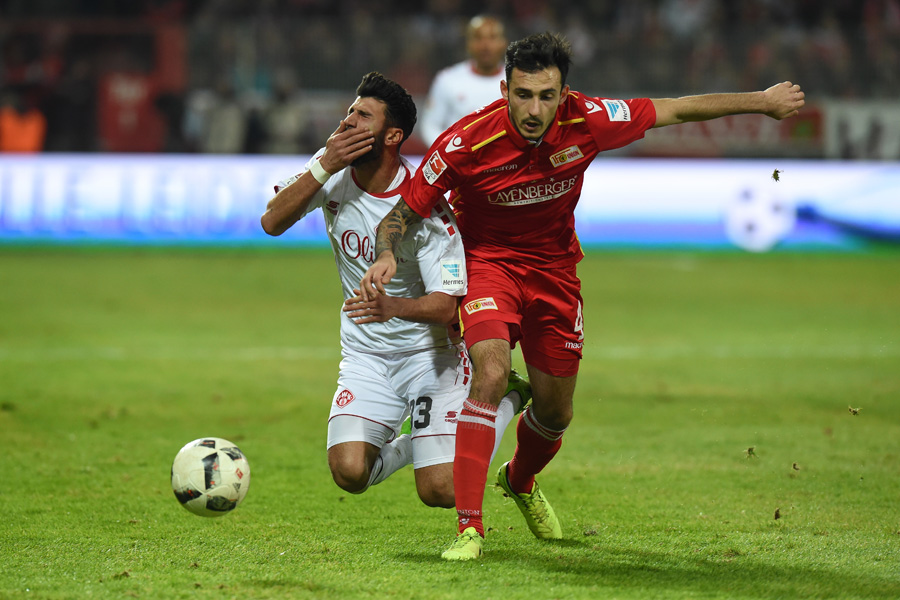
They had a throw in, Rama lobbed it gently to Pisot, or vice versa (it was hard to tell by this point, what with the seething fury in the stands and the searing pace of the pissed off players on the pitch, and it really doesn’t matter any more), but before he had a chance to pause for thought Micha Parensen launched himself with perfect timing, robbing the ball off his toe and clearing it. Parensen leaped back to his feet and raised his balled fists to the fans. “Come On” he bellowed at the crowd, and they reacted in kind. Thunder was beckoned, the gods were being called upon to act. It was his first start of the season and Keller needed him more than ever. “For this year, it was pretty special because I haven’t played that many games,” he says.
Some twenty minutes later, Union were still hanging on. Hedlund had been sacrificed so that Emmanuel Pogatetz could come on in Puncec’s stead, and Parensen had a throw in of his own, in almost exactly the same spot. He called across to Steven Skrzybski out on the far side, the right wing, that he had to come in closer, they had to make the pitch as small as possible or they’d get slaughtered in the last ten minutes by the side with the extra man. Skrzybski puffed out his cheeks and jogged a little tighter in but Parensen wasn’t having it.
No, he demanded. Faster. Closer. Tighter, Stevie. Now!
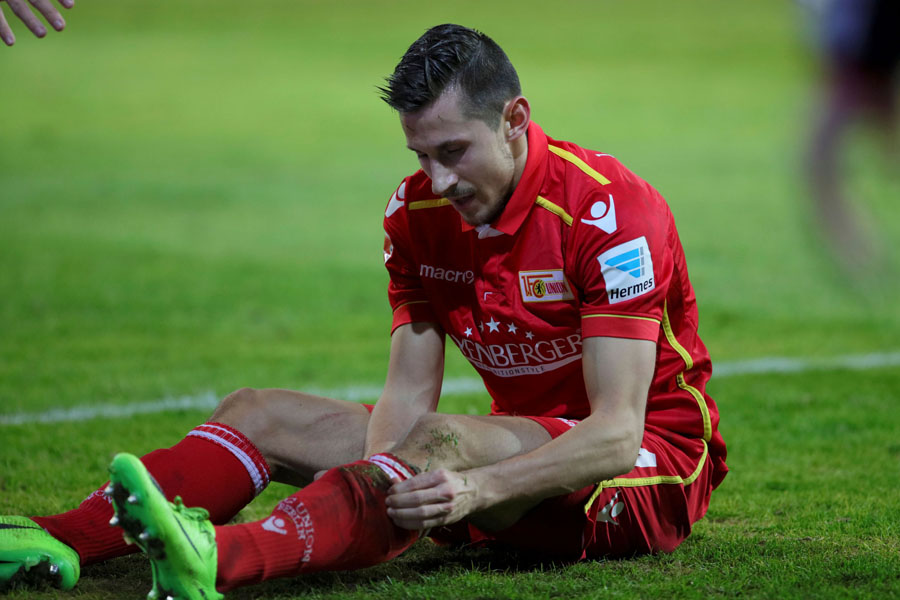
Poor Skrzybski. No one in the whole league had run as much as he had, he’d covered kilometres more than the nearest man. Skrzybski had been coming in and drifting out, he’d been plugging holes and opening up gaps and running up and down and up and down the right hand flank for week after relentless week now. But Parensen was right. The younger man grit his teeth and dragged the Würzburg left back in as far as the centre circle. Parensen threw the ball short, received the one-touch return and hit it long up the left wing. Skrzybski grit his teeth and jogged back to the same spot where he’d been all along.
“It’s always special to win a game with ten men, it’s an extreme situation and brings you together as a team. You can’t replace that missing man so you have to do a little more.” Earlier than that though, with only twenty minutes on the clock Felix Kroos hit a corner in towards the near post from the right hand side. Micha rose and flicked it perfectly across the six yard box where Sebastian Polter had bullied his way into a gap and buried his header to make it 1-0. “That’ll stay in the memory a long time” he says, his grin a foot wide.
He says that he hadn’t meant to set any more of a particular example to his teammates than he otherwise ever would. He did though. It was this game when many were certain that Union were destined to go up to the Bundesliga. And if they weren’t destined for it, then they would fight for the chance of it nonetheless.
You Can get It If You Really Want
Nobody in football used to speak about promotion in advance, to do so could only herald ill portents. It brought bad juju. The skies would turn blood red, the seas would boil, and you would certainly be damned to another season in whatever circle of hell you were trying to get out of in the first place. But, not long after the beginning of 2017, curious noises started coming out of Köpenick. Jens Keller had already started answering questions about it in the affirmative. And so did Toni Leistner and then so did Leistner’s best mate, Sebastian Polter after he triumphantly came back from his own purgatory in a deluded corner of West London with nothing but a desperation to play again and a ludicrous pair of faux paint splattered jeans. Why not?, they would say. We keep on winning and we are in touch with the top of the league.
Suddenly the natural order of things was being turned on its head. Suddenly promotion was not only a mathematical possibility, but people were saying it was a literal one too. “Of course we talk about it”, said Parensen a couple of days before the Stuttgart game where a win would have left Union level on points at the top with their hosts that week, and with Hannover and Braunschweig too. “We talk about it, we think about it and it’s natural that we want to deliver it.”
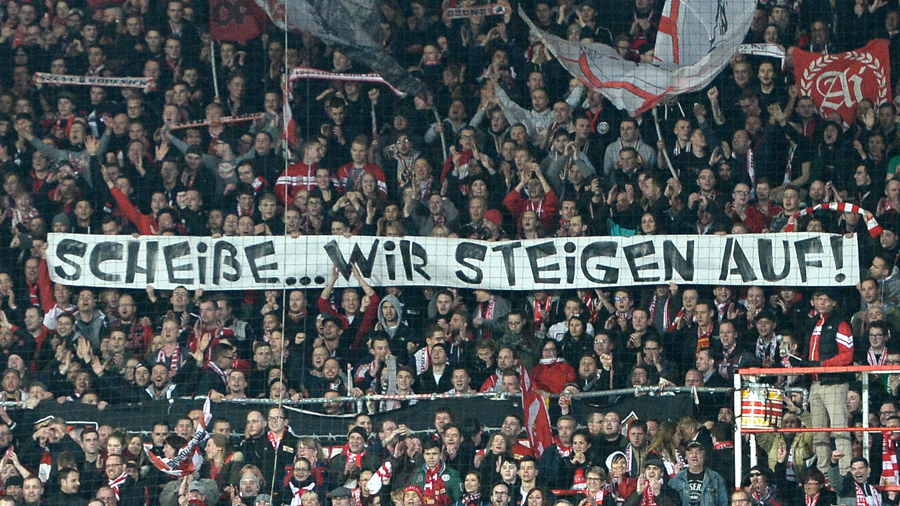
This is what it is all about, after all. “We are sportsmen.” Union weren’t the best team in the 2.Liga but there were moments where they were playing better football than anyone else and then, even when the performances had fallen flat – like in the 90 minutes of drudgery against Karlsruhe when it took a dodgy penalty and a home team who could do everything but kick the damn ball in the damn goal more than once – they had still kept winning.
They started talking about promotion first at Christmas, and then they talked about it when Union were beating Bielefeld and Karlsruhe, and 1860 and Würzburg and St. Pauli all in a row in February and March and then after the win against Nürnberg which took them to the very summit, the top of the table. They kept on talking about it more whenever someone suggested they shouldn’t. Because Keller knew there was little point in pretending it wasn’t happening for the sake of superstition. His players all read the papers, he said. They have the internet.
And they were having fun, according to Parensen. “There’s pressure, but it’s great, when there’s still something to play for. It’s much more fun than getting to the end of the season and playing for seventh or eighth.”
And if there is one thing that Keller’s career up til then could definitively point to, it was that he knew how to get out of the 2.Liga. He’d been doing it his whole life, as a player with Stuttgart and with Wolfsburg and Eintracht Frankfurt, the latter two under the tutelage of the wonderful former HSV striker Reimann, as he had also with an 1860 coached back from the third tier by the cigar chuffing lothario Werner Lorant. “I’m a realist”, says Keller and he pauses for a long time as he thinks about whether he believes in fairytales or not. In the end he dodges that question but he does concede that there is a romantic streak running through him. He may not want us to know it, but he deeply, truly believes in people’s ability to do great things. Right up to the end of the season when it finally became mathematically impossible, despite the power and the infinite resources of the opposition, he genuinely believed that Union had the ability to go up.
He wasn’t alone. Everyone started having moments like that. If not definite thoughts, then dirty little inklings at least that maybe, just maybe something was stirring here.
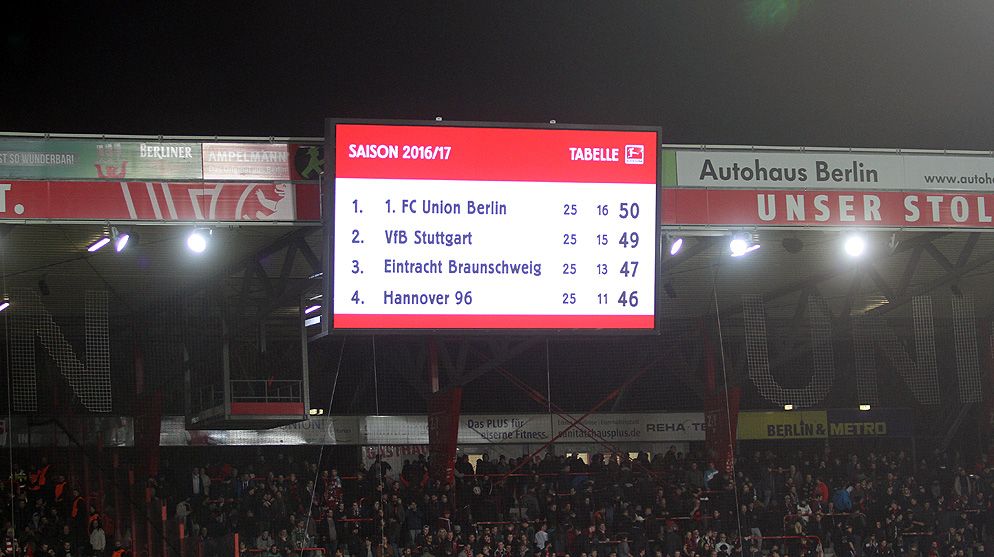
There was the day that St. Pauli had held Hannover to a 0-0 draw, the same day that Fürth beat Stuttgart and the realisation dawned on you that Union just needed to beat Nürnberg on the Monday night to go top. Or, heavy headed and light hearted the day after the St. Pauli match at the Millerntor, not knowing how you got home, but knowing that the same guardian angel that had shepherded you back was possibly the same one looking after this remarkable team, the one that helped guide Polter’s masterpiece of outrageous fortune into the goal, helping the ball to bounce apologetically off his right knee whilst he swung all the time with his left. Or the one that made Wolfgang Wiese somehow miss the ball in the 4-4 draw away at Bielefeld when the Summer was still high.
Or when Felix Kroos hit his free kick against Bielefeld with such violence and precision into the top corner that the keeper is still stood there, in front of the Waldseite, mouth flapping open, wondering where it came from. The second goal in that match was even better. This was where the expansive, modern football of Keller and Pedersen’s dreams started to really flourish. The left back, Kristian Pedersen, was out wide, battling. He found Fürstner with a simple little ball inside. Fürstner shifted it right to Trimmel who, from 30 yards out, burst suddenly into the box before clipping a wonderful ball back across to the back post that hung in the air for an hour. Trimmel’s ball had been hit so sweetly that all Damir Kreilach had to do was get his head on it.
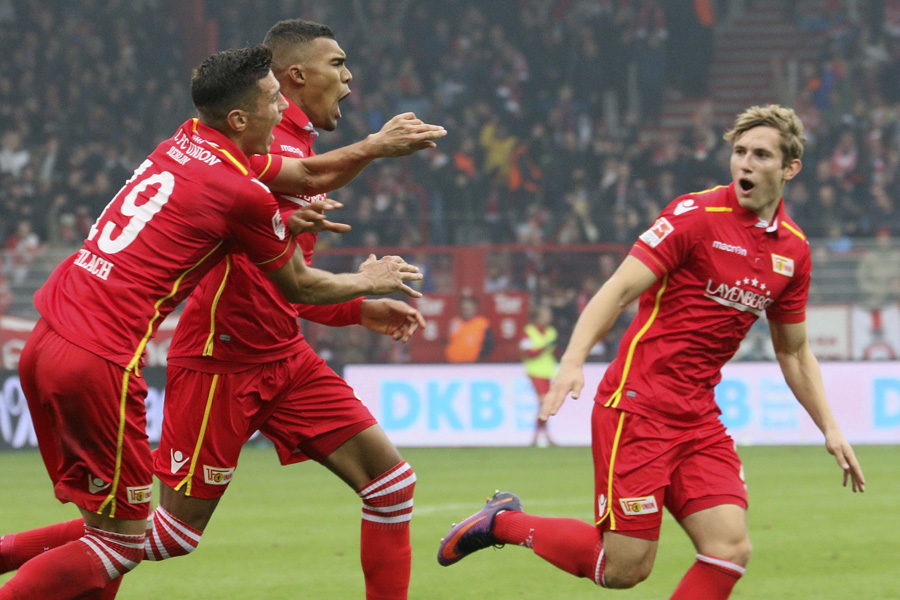
It might have been much earlier, though. Maybe during Collin Quaner’s remarkable match changing cameo against Hannover where in the space of five minutes he turned the game on its head, scoring one and setting up the next as central defenders who had previously looked calm and collected were suddenly reduced to jabbering wrecks, shadows of themselves in the face of a big man who looked gangly and uncomfortable off the pitch, but for the space of five months suddenly turned into the most penetrative, devastating striker in the league. Quaner’s volley in the 4-0 against Karlsruhe was a thing of beauty, his astonishing drive, in off the underside of the bar in that breathless draw in Bielefeld, was simply brutal.
Against Würzburger Kickers Pedersen had displayed his inexperience. It was inevitable at some point. He hit a lazy backpass, not a stinker, but with all the imprecision of a young man thrown into the deep end learning how to swim. The striker, Nejmeddin Daghfous, was onto it immediately but Toni Leistner performed a sliding tackle of such magisterial controlled aggression, that stretched for what looked like ten paces. The shot afterwards was calmly tapped straight back to Busk. Rico Benatelli, following up, had been so awed, so cowed by the challenge it looked like he was afraid to shoot at all.
Or Skrzybski’s first time volley against Stuttgart. Or his chip against Aue. Or, or, or. Stevie had developed into one of the finest players in the league, he looked at times like he was going to try and get Union promoted on his own.
Or Hedlund’s goal against Braunschweig when you could see the weight lifting from his shoulders, a black cloud ascending into the skies above Köpenick. They had fight and they would stick up for each other. Pedersen’s face was torn up against Bochum and he played on. In the first few minutes away at Karlsruhe, Sebastian Polter went down a little easily. There was a bit of shirt pulling, not a lot, but just enough. The home side argued and bitched and whined about the penalty decision, they went on and on and on. Meanwhile Polter had already spoken to Hedlund, he’d given him the ball, a selfless gesture to say that this was a team, that it didn’t matter who scored the goals. It just mattered that they went in.
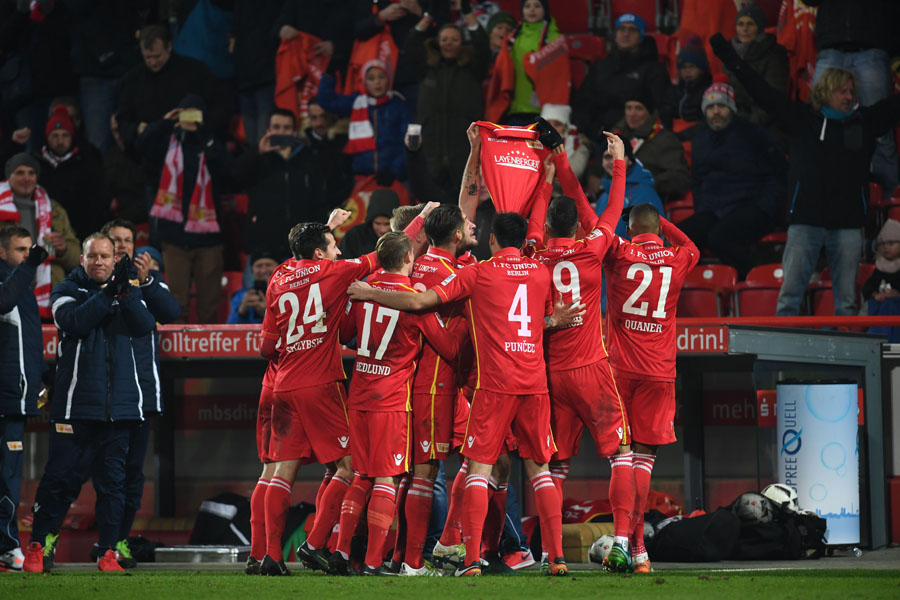
The week before, in the draw away at Fürth, after Leistner’s towering header the players crowded round to celebrate, holding up the shirt of Hosiner whose lung had collapsed during the week. They were worried about their teammate and they wanted to let him know.
And then there was the game itself against Nürnberg. An hour had gone and Skrzybski was running himself into the ground as always, breaking his back holding the right hand side down whilst trying just to carve the guests open, knowing that a single goal, and with it a single win, a simple three points would ensure that top spot. Union looked edgy and the crowd had begun to feed off it, getting bogged down in a nervous torpor. The Alte Försterei was hushed halfway through the second half. Sebastian Polter had missed three presentable chances, hitting the post in a one on one with the keeper that he would usually bury a hundred times over.
But then the referee pulled up lame. Keller pulled his troops together, he used the break like a basketball time out. Union reappeared reborn. He hoiked Kroos off and brought on Hosiner. It was a gamble. Skrzybski took in one last deep gulp of air as if he was diving for pearls and burst, cutting inside before killing his momentum and squaring the ball back into the path of Hosiner. He finished and the delirium was all pervading, the party suddenly broke out, it was loud and chaotic and beautiful and wild.
And all around were people, people like Mario, who couldn’t believe what they were seeing. People who remembered a friendly against Hertha still under a decade ago, who had proudly worn their red building site hats that night with tears in their eyes because there was finally, for the first time a roof to come off at all.
At points back then when everything was going right, when every substitution seemed like a master stroke, when every goal seemed decisive, when every tackle seemed to be delivered with the hammer of the gods that it looked like, actually, Union could walk the league.
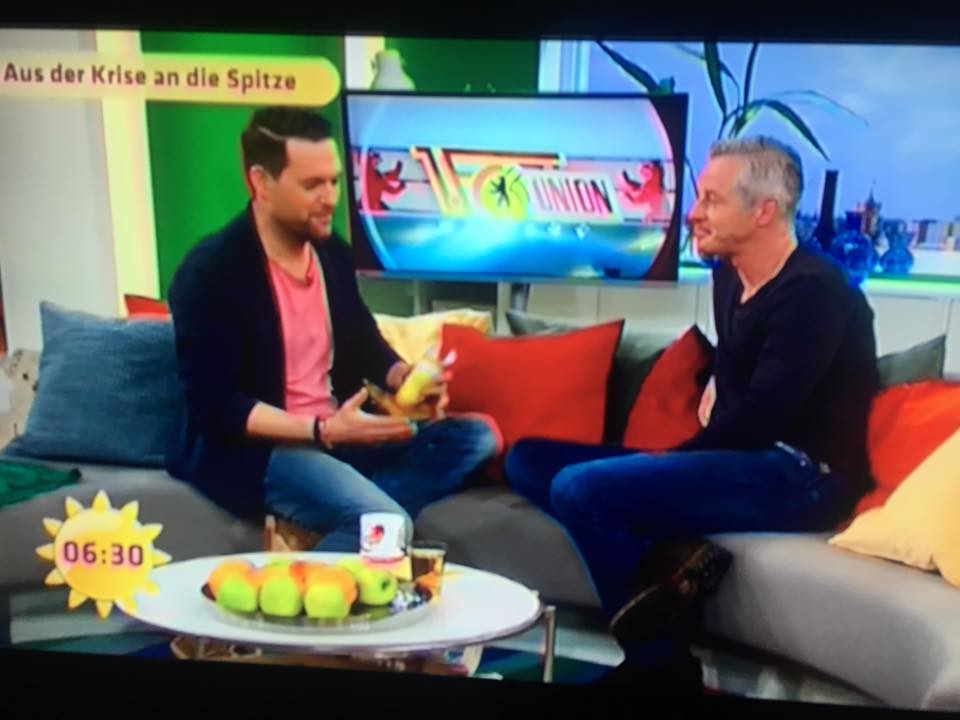
Keller appeared on breakfast television not long after Nürnberg. Press conferences grew perceptibly fuller, interview requests grew more and more and more common, and from the national press too, from TV, from all over the world people started looking at this little club and the almighty things they were achieving.
Keller on TV was something else. He was warmer than in the press conferences. He’d still catch himself thinking “oh no, not this stupid question again,” but then he remembered where he was and he beamed, and he sang to them that old song of his, his favourite, the one that went “why not, why shouldn’t we be at the top of the league?”.
Demons
Dirk Zingler is certain, Jens Keller is too. Union will be in the Bundesliga soon enough. They must be, it is the whole point of all of this but some see that very ambition as being fraught with danger. Union have always defined themselves through their enemies, what happens when they’ve slayed the last of their demons, will it just become a quest for ever more money? will they turn on themselves, will they just recreate the scene in Komm, wir finden einen schatz?
“Schade,” said the little tiger. “Your share is now gone.”
“My share?” said the little bear. “How is it my share? It was your share you idiot.”
And the little tiger called the little bear a wretched bloody fool and this went on, back and forth, until they started brawling.
Micha Parensen, however, is certain that the fight will never be won, that Union will never simply roll over, that they’ll never become gentrified and commodified like the creep that has already overrun many of Berlin’s wildest corners, and he wants Union to have their chance to shine in the Bundesliga exactly because he knows that there, too, be demons that need to be slayed. Yes, he has picked up plenty of the bullishness and belligerence of Berlin. “I don’t think it could happen because we…” he corrects himself quickly, remembering he’s supposed to be a player, not a fan, “…the club, and the people, they have this unique identity. They polarise people. There will always be an enemy. That’s why it will never happen. Union aren’t a club that will have people saying, ‘whatever’. They’ll never be a club that will just fit in, that you can put in a corner.”
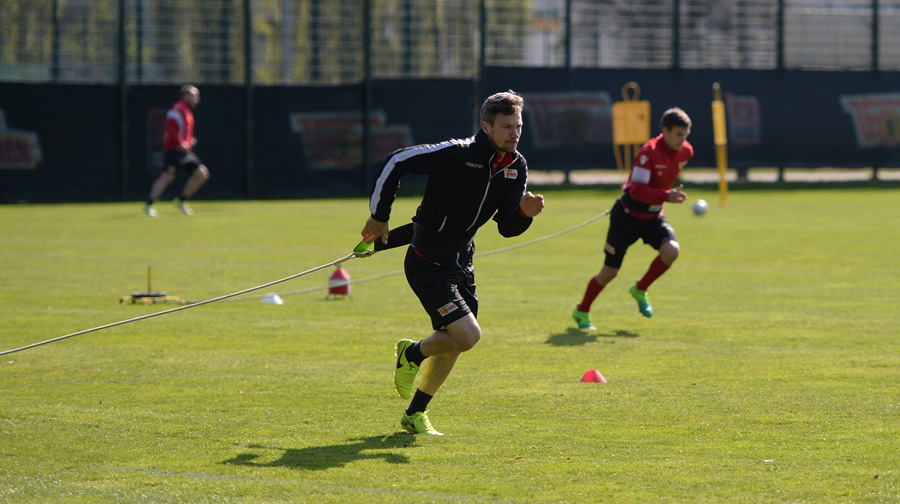
There it is. He can’t understand the concept of Union selling out, and he certainly doesn’t see that there can ever be too many new people coming along. As long as they want to belong. It would just mean more righteous people spreading the good word, fighting the good fight. And he knows they’ll need the numbers.
“I understand it a little, when I’ve met people and they’ve explained what lays behind this thinking. But actually it makes no sense. Because, why do we do this, why do we play sport? We want to be successful. Union is a special club and it will become even more so when more people come on board, and then more will come along after that. It can only be positive, I don’t even see how it can be a negative.”
“Oh you pathetic idiots”, said the finch in the grass. There you are, both fighting your best friend in the world, and all just because of money. Tomorrow the King’s officer will come back, and you’ll have nothing left. Not even a friend either.”
Micha remains, he endures, and he understands. He is the finch in the grass. The Unioner love him unquestioningly because he is wise and he never gives up. He never gave up when his knee went, and he never gave up when he was dropped. He’s been fighting demons since the third division and he knows there’s plenty of the bastards yet to be conquered.
Things fall apart
There was something nagging away at them, something inside of the squad meant they couldn’t enjoy being top of the league. “You start thinking that you have to hold on, you have to stay there. You try and defend your position, and that then is already a different way of thinking. It’s more difficult when you are changing things around, a new routine,” says Parensen, the sole remaining player from the last side at Union who had found themselves in this position when they won the 3.Liga eight years before.
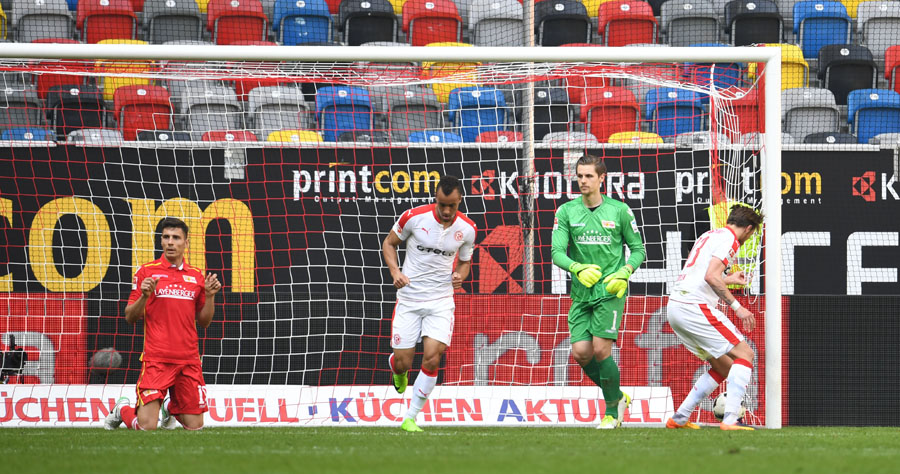
Union struggled through to the end of the season, they threw away a two goal lead against Fortuna in Düsseldorf when they were coasting, bossing the home side around like a failed copper with a sore head and chip on his shoulder only for Damir Kreilach to score a horrible own goal that went in in stop motion, agonisingly, horrifically, it was a cartoon sadistically animated. They lost at home to Aue when a win would have kept them level at the top of the table. They lost in Stuttgart and in Hannover and then in fucking Braunschweig where, on the way home, the bus was largely silent as the players contemplated the dreams they had harboured being punctured so easily. It took a couple of days for them to shake themselves out of the reflective misery.
For many this was just the natural order of things being restored. Maybe the players also had failed to pay attention to the lessons that Keller and Pedersen had been giving them all along. Maybe they believed that things were only going to go wrong at some point. Maybe they were the architects of their own doom, knowing they would be feted anyway. To lose gloriously at some clubs is a sin because they focus on the former word. But at Union they will still only hear the latter. Gloriously.
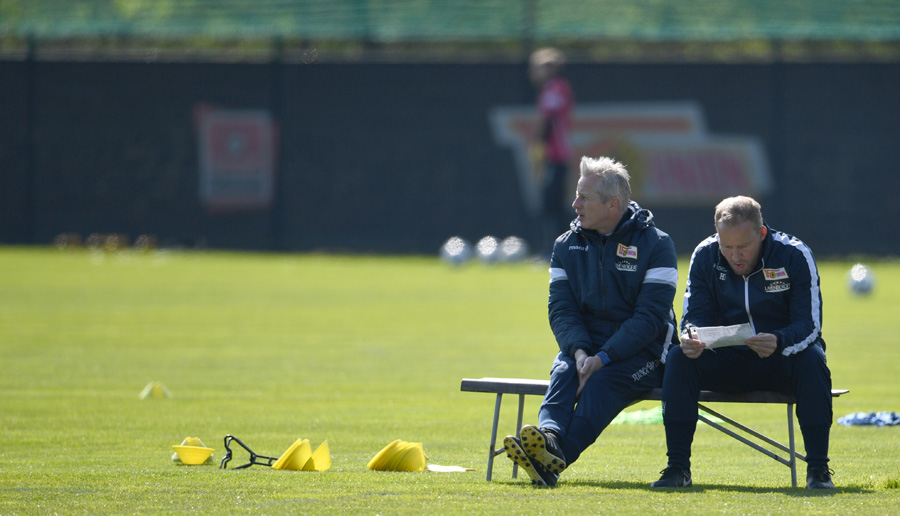
Henrik, of course, has a theory about why things started to fall away after the high water mark that was the Nürnberg match. It concurs largely with Micha’s. “What happened is that we were playing well, we had established our identity. And when that happens people want to protect themselves, protect that position, because they are afraid to lose it.” They stopped looking for new solutions through fear. “And then before we start to play football we start to think, and when we start to think about this, then we go onto the pitch and we can’t play our football any longer. And the same happened when we got to number 1. ‘Phew’, we thought. ‘Now we are number one. We’ve been fighting for this for so long. Now we are here’. And we were afraid. We asked ourselves if this is all really true. Can we allow ourselves to be this good?”
Stuttgart and Hannover had both suffered from it. They were under more pressure than Union, but they were bigger, wiser, stronger and could deal with it better. They would come back whereas Union started to fear.
The magic number
Jens and Henrik met in a bar on holiday. Over a beer or two they discussed their philosophies on the world and on the eternal conflicts between the head and the heart, and the need to have technical structures malleable enough to be bent out of shape easily around the most human of traits. And they talked about football, the game they both adore more than almost anything else, but which neither of them can really play again, whether it’s through age and a lack of time, or through the failings of the flesh. Or a mixed up combination of the lot. Theirs is clearly a partnership of advantage, they both have an ambition that is white hot in its burning intensity, and they get from the other what they can’t provide themselves. But it is also clearly a friendship. They speak about each other glowingly, they spend a lot of training just talking about football or tactics or about hearts and minds whilst keeping an eye on their players in the distance. Keller not only trusts Henrik implicitly, he seems to soften in his presence.
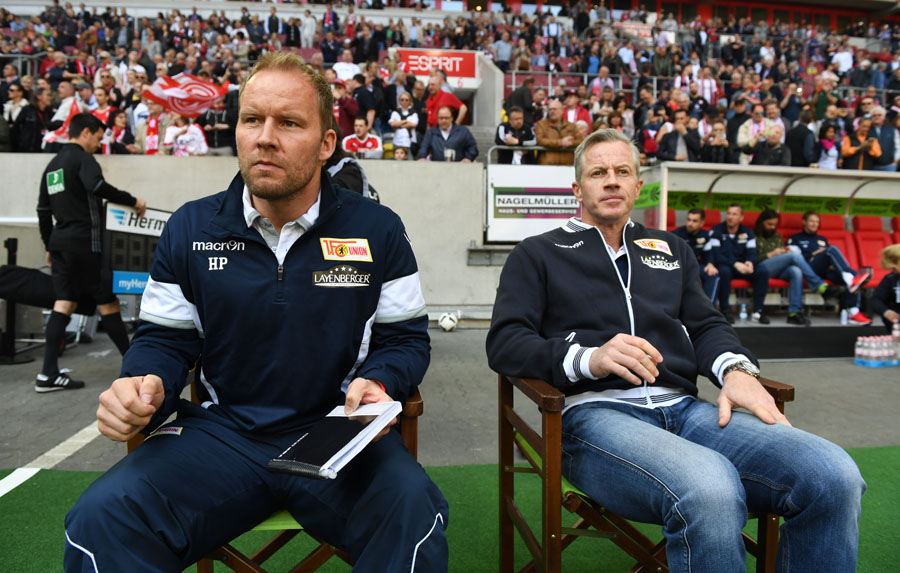
“Jens is waiting for you, Henrik. You said you’d give him a lift home.”
“Yeah, but I’m just busy right now. Can you not take him?”
At this a slightly flustered media team underling pads down his jacket, looking for a set of keys that were never there in the first place.
“I haven’t got a car”, he says.
“Well tell him to wait then.”
About five minutes later the boss appears out of the tunnel that leads down onto the pitch and waits patiently while Pedersen finishes a point to a writer that he is sat next to in the dugout.
“You said you’d give me a lift home. You almost done?”
“I’m just doing this. Five minutes.”
The writer tries to hurry things along, he doesn’t thrive off confrontation. He doesn’t want to be a nuisance.
“No, it’s not a problem”, says Pedersen. “He can wait”.
On the way out the writer passes Jens Keller toying distractedly with his phone in the entrance to the stadium, he looks up from it and says goodbye easily, pleasantly, like there was nothing else going on anyway. He was just waiting for his mate Henrik, this cool guy from Denmark who understands people inside out, but is also really into the fundamentals of hard pressing, who can talk for hours about the fundamentals of modern football, the exact timings of when to use the ball, how to have your side ready and at its most dangerous, and when to sit back, to let them catch their breath and let the ball do the work.
“We fit very well together,” says Keller about Henrik. “We have the same sense of humour, we understand each other very well on a human level. Henrik is also a very experienced trainer, he’s been doing this since he was young, he helps me, and together with my experience, I’ve managed Champions League,” he says needlessly. We know he’s good already. “We complement each other very well.“
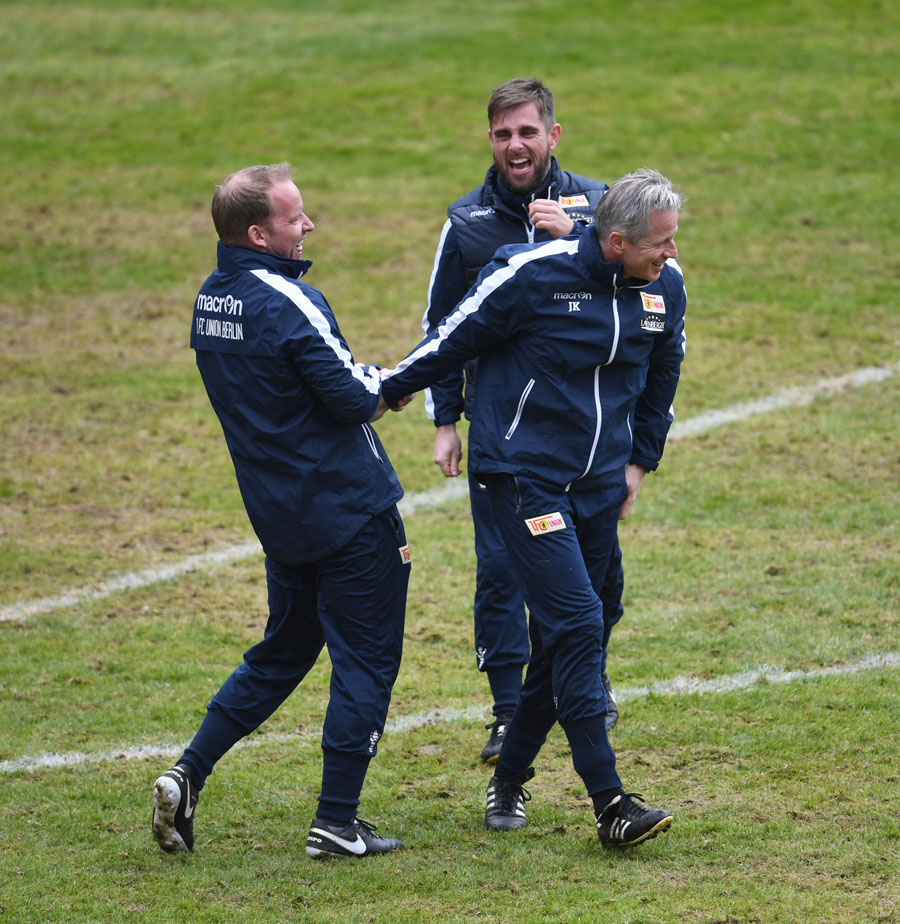
There is of course a third partner in this triumvirate. In training and before matches it is not Keller or Pedersen leading the players in their warm ups, in their shooting practice and in their endless miles of shuttle runs. Sebastian Bönig is thrown into the mix too. The man who not only has a third division winners medal, like Micha Parensen, but who more importantly also has an Oberliga one. Neuhaus pushed him aside during his second year at the club, feeling threatened by his status whilst needing to refresh an ageing back line. Böni, however, remains the man who came back, the Bavarian born player who is a Berliner at heart, he came back when he’d been frozen out as a player and he came back when his business failed and he needed to find a new start in life, when he needed to start properly coaching. He is the soul of of this strange little magic circle. The link to the past and the visible reminder to the fans of how far this club has really come. “He knows the club inside out,” says Keller. “He knows the structures, he knows why things happen, if and when they do. He is a young trainer and he is learning from us, but he is also there 100 percent, he is meticulous in his work. He is an unbelievable help going on.”
Böni is important because Henrik and Jens because… well, they certainly shouldn’t fit to a club like Union. They make a weird pair, but away from the gaze of the media they become normal again. Keller, particularly, shows a warmth at times that at others seems impossible. “I don’t know if the fans understand me. I think that they respect the work I have done. But I think I understand them. They are emotional, positive. They are exceptional. I think we fit together well.”
On breakfast television during that glut of media performances that he was dragged around the country’s television studios for in the wake of the win against Nürnberg, Keller was asked about why he chose to live in Köpenick and not in Prenzlauer Berg with all the other Swabians. In it was the implication that he didn’t belong there, that Köpenick was still only known for Germany’s greatest trickster and the vicious hate of the NPD, so he must be doing this to try to make a point to the fans. It must be some kind of trick, after all.
He won’t have it. When he has the opportunity to throw out an easy soundbite about being near the spiritual home of the club he simply says that he likes to be near work. He has no intention of spending three quarters of an hour in the car every morning.
It is, in its straight talking way, a very Berlin kind of answer. He says you can think what you like, he doesn’t really care. He is here to do a job. To help others play football.
Union’s fanbase has changed enormously over the last decade. They are certainly no longer mostly the sons of the blue clad workers of Oberschöneweide, the Schlosserjungs, any more but that doesn’t mean that they have to lose what it is that holds them together or what makes them special. In their very status as the most modern of outsiders Keller and Pedersen, these two great friends with these crazy ideas, actually fit perfectly to Union.
Endless Love
I have all of life’s treasures
And they are fine and they are good
They remind me that houses
Are just made of wood
What makes a house grand
Ain’t the roof or the doors
If there’s love in a house
It’s a palace for sure
(Tom Waits)
As Jens Keller looked out onto the packed stands of the Alte Försterei for the first time he knew that almost everyone was there who was supposed to be there. But not everyone. Mario’s wife Janine wasn’t there.
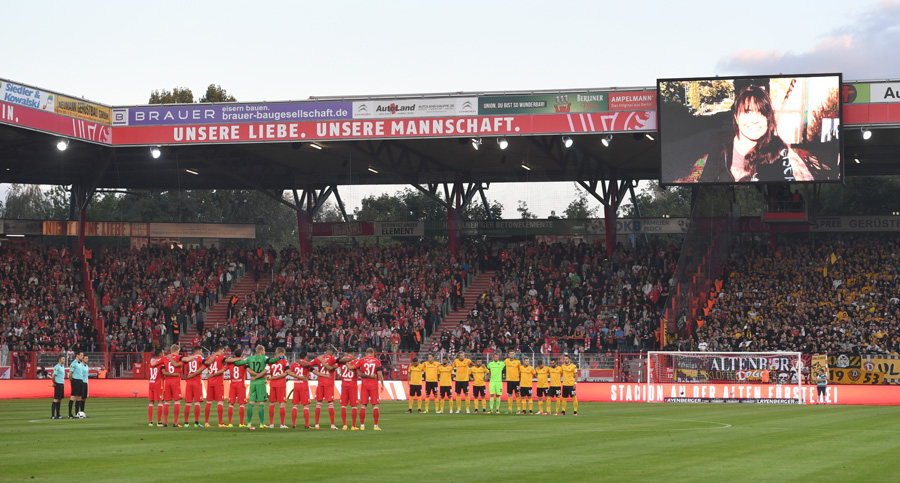
They’d gone to their first Union game together, a loss to Unterhaching, in about 2002, it was the beginning of a whole new world for Janine, she was struck, smitten by this beautiful man and this club he belonged to where she was as welcome as anybody else. Within what only seemed like days she had thrown a stone into the pool at Union that created ripples that still roll out today. If a person in a wheelchair at a game is looked after even just a little better, if their view is just a little finer, their way in a little easier, then that is because of Janine. Until Janine spoke up, fans in wheelchairs weren’t allowed to even carry flags into the stadium. She wasn’t having that, she worked tirelessly for those, like her, who were in wheelchairs, but not out of a sense that they were unique and needed special care. She didn’t act out of sympathy, but just because they were just football fans and someone needed to stick up for them. She was a tiger, utterly fearless.
Janine was at every meeting and every social event over the next 15 years. She knew everyone and everyone knew, and loved her. She badgered Union to get them to do things right and when she came up against a brick wall, she would badger them some more. Mario tells a story about a high ranking member of the club who wouldn’t budge on apoint that she found fundamental. So she went to Dirk Zingler instead, she went to the top. And got her way. She always did, it was a skill she’d learned as a Judo champion years before, at the tail end of the DDR.
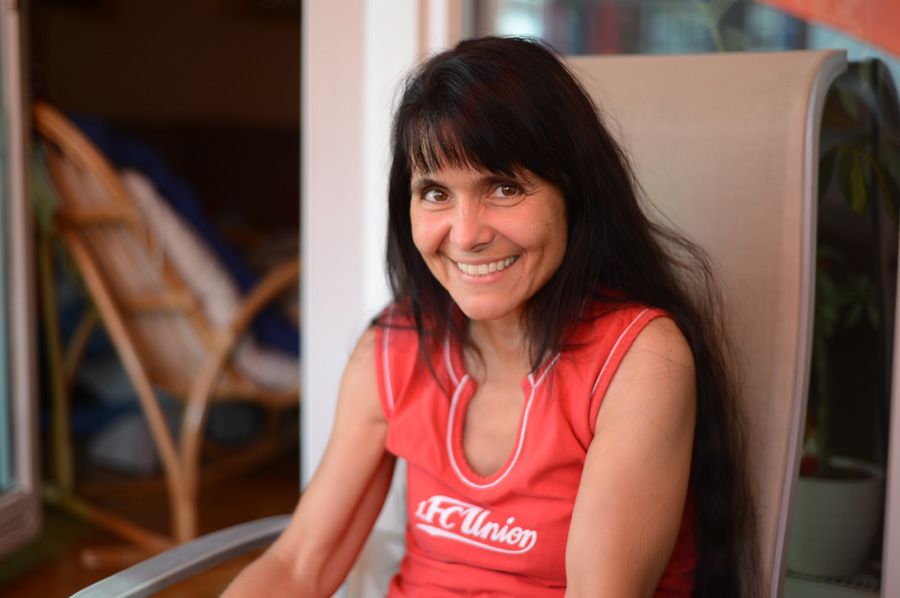
In it you use other people’s perceived strength against them, their momentum is your greatest weapon. The smallest can always defeat the biggest, there is no weakest in Judo. “It was in her personality. She had this conviction, she didn’t need to argue,” says Mario. The man who loves her and who she loved more than anything on this Earth. Even their football club.
Mario has only ever missed one of the yearly members meetings. He had a cold. It turned out to be the one where Janine was presented with the bronze medal of honour. He still laughs about that. He thought that the cold was the worst, at the time. It was just a cold though.
But not long ago, just a week or two before the first home game of the season, the bike Mario was driving, with Janine on the back, ploughed into the side of a car pulling out unseen onto the road just in front of them. The bike lay helpless on its side afterwards, a ton of useless metal, leaking fluids for some time after. The man and his child in the car walked away from the crash, thankfully they were okay. Then two helicopters came, Mario’s was red, Janine’s was yellow.
And Mario survived while Janine didn’t.
They’d talked a lot about death before. It wasn’t morbid, just practical. Janine had fought with her multiple sclerosis a long time, and they’d liked the way that fans in foreign countries had not stayed silent to mark someone’s death for a minute as was the standard. They had applauded their life, instead. Mario asked the club that if they were going to do something for her then he’d like it if they could do the same.
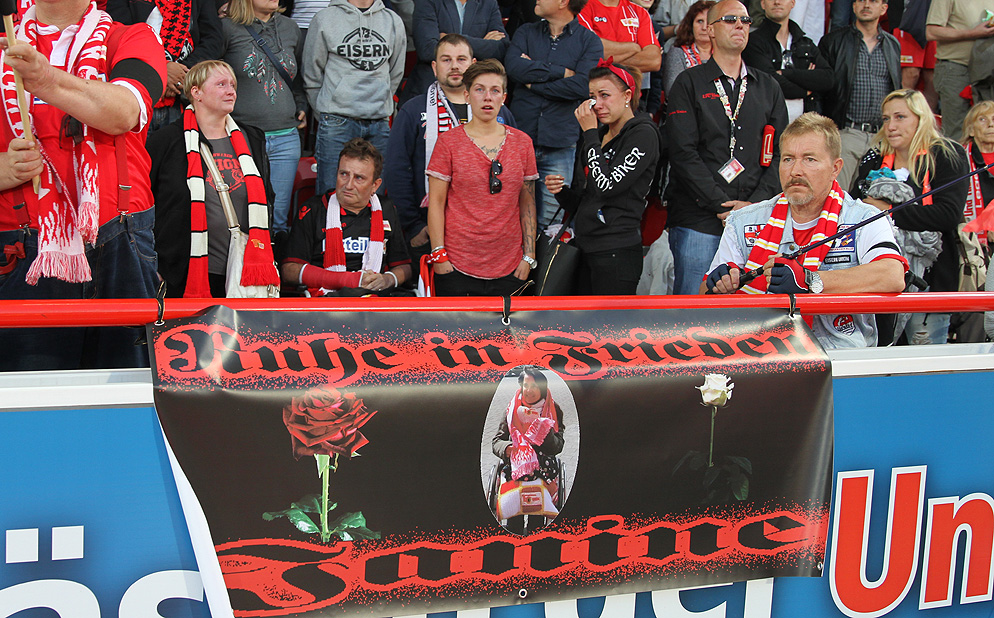
Christian Arbeit, the club’s head of press and stadium announcer told Mario not to worry. They’d make sure that her wish would be granted in the minutes before the kick off of the first home game of the season. Against Dresden. As he told the sold out stadium about Janine he did everything he could to hold it together. He took a pause as his voice broke and then told everyone that what they just had to do was to remember their friend, and to make as much noise as possible. And as you looked around, you could see hundreds of people doing the same, clearing their throats, biting their lips, scrunching their fists into the tightest of fucking balls, squeezing them so much they could have bled at the knuckles, doing anything to stop themselves from breaking down, from punching the walls in frustration that this beautiful woman couldn’t be here in the spot for those fans to watch from that she had won for them. The Dresden capos at the front of the away end gave out simultaneous instructions. She was one of us, too, they said. She wasn’t just an Unioner. She was a football fan.
And as the referee blew his whistle to mark the minutes applause the stadium erupted in a way that it had never before, hasn’t since and hopefully will never have to again. It roared like thunder until the roof shook and until the foundations quaked. The noise overwhelmed the terraces until it rattled every last beam, rivet and bolt, and every last blade of grass in that stadium she loved so much. From the Dresdener and the Unioner. This wasn’t a battle cry, it was one of anguish and of respect, and it was one of endless, undying love. It was dedicated to Janine’s memory, but it was to tell Mario, too, that he would be looked after. It was to tell him that his family were with him all the way.
Mario has taken on the official role that Janine had at Union, it is now up to him to fight for the rights of disabled fans at Union and across the country. “No, it won’t be easy. But it’s important, I need to somehow keep it going for Janine. Because she loved the job. Union was everything for her.” There still aren’t enough places at Union for people in wheelchairs. He’ll fight to change it. Like a tiger, too.
“I’m a man who always goes forwards. And now, too, but… I miss her. I lost my mum when I was 18. She was 36, lung cancer. My Dad died eight years ago. But despite that, losing Janine, there’s nothing worse. We did everything together”.
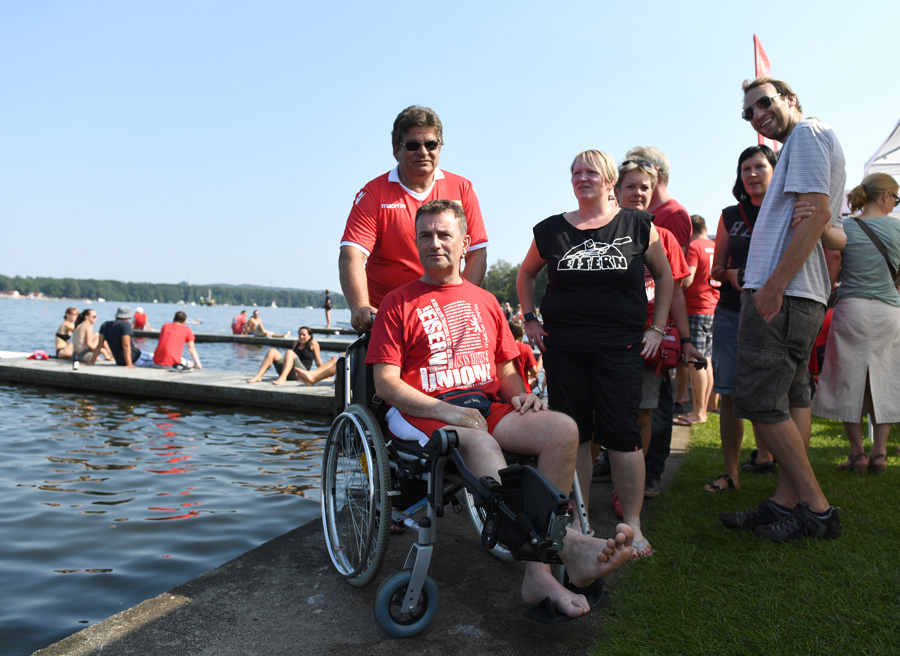
As Jens Keller looked out onto the packed stands of the Alte Försterei for the first time he knew that almost everyone was there who was supposed to be there. But not everyone.
“It was a very difficult moment for me. I had a very good friend who had also died just three weeks before and it was…” Jens Keller never leaves the impression that he doesn’t know what to say. But here he stopped. “… That’s why for me it was a very moving moment. Yeah, because I then thought about her, and, then… Well, I’ve also never experienced anything like that in a stadium, such sadness, such an atmosphere of togetherness.”
And you want to know the most remarkable thing of all? There wasn’t a single Scheiß Dynamo shouted out for the rest of the evening. Not a single one. That the Dresdener had shown such respect and love to Janine was paid back in kind. In death she had brought the hated rivals together, even by just the tiniest of margins.
Sunday Morning, Coming Down
Henrik went into the dressing room after the Fortuna game straight away. They’d thrown away a 2-0 lead and in all actuality this was the beginning of the end. They were now a squad that was already starting to look a little ragged, whose panting was getting heavier with every breath, and whose steps were growing perceptibly heavier by the minute They were at the very extent of their abilities. They lacked experience, too, as well as that killer instinct. Kreilach had scored two own goals in three games. Leistner had made mistakes. Puncec had too. Skrzybski finally had run himself into the ground and Polter got suspended for the critical Braunschweig game when they needed a big strong leader more than ever. Henrik tried to talk to them, he sat them down and told them “It’s just experience. And it’s just football, yeah? Can we be in the moment and make our decisions with patience and acceptance and…” he searches for the right word though when it comes it could have been signposted in letters a mile high half an hour back down the road, because he knows the one thing that really makes this club tick all along “… love.”
But it wasn’t to be.
A couple of weeks later, as Maxi Thiel trudged off the tatty Braunschweig turf he would be forgiven for his mixed emotions. The injury that had almost destroyed his nascent career had been bested at last, he had finally managed to make it to the end of a tunnel of endless recuperation and rehabilitation, of operations and setbacks, of endless weeks of training alone, trying to build up the muscles around his knee and of nights spent worrying if it would ever come to an end. A couple of years back, in the middle of enduring all of this shit, all these endless setbacks, he’d told the Kurier “it would just be nice to know where it all comes from.” And now he had scored in his first game back in the shirt, the first competitive game he’d played in over 14 months – a scrappy, bundled nudge of the ball back past a keeper who was already falling the other way, back in front of him rolling along the goal line and in, before it reached the far post at a snail’s pace – but his fantasy was incomplete.
If fairy tales came true, if country music was wrong, this should have been the goal that helped Union claw their way back into the game and then on, forwards, marching towards the Bundesliga and history. But life doesn’t often work out like it does in our dreams. Even now he knew that this would be one of his last significant actions in Köpenick. He’d already been told he would be leaving Union at the end of the season.
The story of Union coming fourth in the 2016-17 2.Bundesliga is the story of arguably their greatest league season of all time and yet it still felt like a loss that night in Braunschweig, a cruel punchline to an otherwise impeccably told joke. A demon had been waiting, unseen, around the corner just for them.
Keller could still reflect positively on what they had done, nonetheless. There was one word he kept using, he was deeply “proud of them, proud of everything we have acheived, throughout the whole season. I am proud of the way the players have developed and that we have brought the club just a tick further forward, that Germany has noticed us a little more. I was proud of how we played in Dortmund, we all can be when you look at what we’ve done.” And now Union are no longer a secret, it’s going to be harder next year. “But that is why I’m here. To train Union in the Bundesliga.”
In Braunschweig the travelling fans roared like they had all season, but they did so now with an extra decibel. There was something else audible from the thousands of away supporters who had out sung the home team all night. It was there in their smiles and in the twinkling of their drunken eyes. There was that pride pouring down from the stands like it was Niagara falls. Maxi struggled to hold back the tears. He was confused. Maybe even, this was as good as victory. It certainly felt strange for a loss, it wasn’t usual for all of your hopes to be dashed so summarily yet it to feel this warm, to feel this protected.
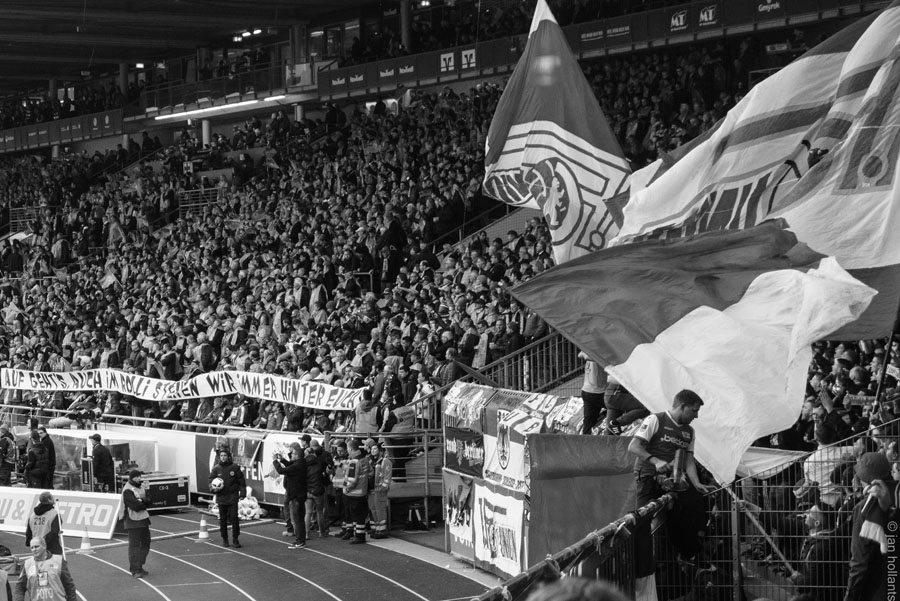
Micha Parensen was the first to go to Mario and the fans in wheelchairs there after the 3-1 loss, to thank them for their support, to let them know that he cared and that he loved them and that without their support Union would never have come this far in the first place. Mario caught his eye and he smiled a little longer than he had in a while. Despite the result. They’d have struggled to get there at all were it not for Janine. It is the spirit of the club that Parensen, the senior player, the Berliner, understands implicitly. “And we try to embody that a team, this is a huge part of Union, of our identity. We can never lose that…” He doesn’t quite know how to end the sentence and trails off. He doesn’t have to.
In the week after Union reached the top of the 2.Liga, at a public event featuring those two best mates, Polter and Leistner – after they had shaken everyone’s hand and answered all the inane questions from the teenage girls and the grown up men like every one of them was a human being who deserved the time and attention that anyone else does – Andreas Lorenz, a former editor at the Berliner Kurier told me something. He said, “You don’t have to be impartial. It’s impossible”. He knows as well as his erstwhile colleague and Union chief reporter and stalwart Mathias Bunkus does that there is no not getting emotionally attached to this football club. He continued, “if you are good at your job and you want to understand how a football club really works, and if it is supposed to mean anything at all, then one can’t help but fall a little bit in love with it.” For fuck’s sake, what else is the point. “Political journalists have their side. The music and theatre critics have their side… Everyone has a side they support.” He’s a gentleman, Andreas, as is Bunki, and they are both deeply proud of their adopted home. It’s infectious. Or as Henrik puts it, “I think we have to learn from the fans. I say to the players, if you learn to support each other as the fans support us, then we will not feel fear on the pitch.”
Janine taught us that, too, though she’d hate for you to say it. She taught us not to be scared. She welcomed everyone in and she would fight like a fucking tiger if they were not being treated as every single last Unioner should.
For so many clubs, coming fourth in the 2.Liga would be barely any reason to celebrate, to give thanks and love and joy and devotion in such overwhelming force. But this is far from being any other club. And, as Andreas said, you can’t help but be sucked in by it all. And as the waves of thunderous applause rang out from every corner of the Alte Försterei in Janine’s honour before the game against Dynamo Dresden I loved this football club and really, honestly, I had rarely felt so proud in my life .
Entdecke mehr von Textilvergehen
Melde dich für ein Abonnement an, um die neuesten Beiträge per E-Mail zu erhalten.

In Tagen von tiefer Trauer und lauten Fragen nach dem Warum??? schenkt uns Jacob Sweetman diesen majestätischen, großartigen, wunderschönen Wal von einer Geschichte.
Ich habe gejubelt und geschluckt, die Faust geballt und Tränen vergossen, Union gefeiert und das Leben (den Tod nicht akzeptierend, aber verstehend), ich habe mich dieser Geschichte hingegeben und es nicht bereut.
Wenn es eine Hall of Fame für Texte über Union geben würde – diese Zeilen wären dabei!
Thanks, Jacob, thanks for the ride!
Alter Falter, hab ick jeheult!
Danke für diese Zeilen!
[…] Der Text erschien zuerst auf Englisch und wurde übersetzt von Daniel Roßbach, Gero Langisch, Hans-Martin Sprenger, Robert Schmidl und Sebastian Fiebrig. […]
[…] dann las ich bei Steffi und Sebastian diesen Text von Jacob Sweetman und wusste, dass ich mich nicht weiter bemühen […]